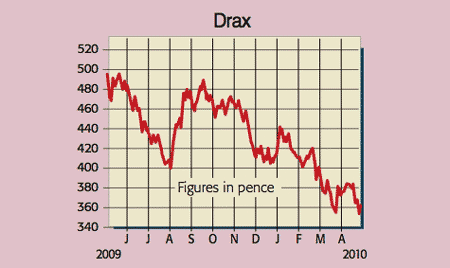Get the latest financial news, insights and expert analysis from our award-winning MoneyWeek team, to help you understand what really matters when it comes to your finances.
You are now subscribed
Your newsletter sign-up was successful
Want to add more newsletters?

Twice daily
MoneyWeek
Get the latest financial news, insights and expert analysis from our award-winning MoneyWeek team, to help you understand what really matters when it comes to your finances.

Four times a week
Look After My Bills
Sign up to our free money-saving newsletter, filled with the latest news and expert advice to help you find the best tips and deals for managing your bills. Start saving today!
Energy security and global warming are two of the biggest issues facing mankind. Not only will demand for power rise over the next 40 years, but there will also be a much greater need to wean our transport and heating systems off oil onto zero-emission electricity. So where does this leave Drax Group, the owner of the largest, cleanest and most efficient coal-fired power station in western Europe?
The firm's generation site is located in Yorkshire and produces around 7% of the nation's electricity. The majority is fed directly into the national grid. The remainder is taken by its distribution business, Haven Power, which serves 24,000 customers. Given its scale, Drax is vital to the UK meeting its energy requirements. And its importance will increase as the North Sea's oil and gas output steadily dwindles, nuclear sites are decommissioned, and 15% of the country's less-efficient fossil-fuel power stations are closed by 2015.
On the environmental front, the Drax plant is equipped with flue gas desulphurisation. It is also capable of burning biomass, which is organic materials such as wood chips, identified as a key plank in Britain's strategy for generating 15% of its energy from renewables by 2020. Additionally, the board is planning to invest £2bn in a 60:40 joint venture with Siemens to build three dedicated biomass-fired stations. Once completed, the project will be the largest of its kind in the world, and will enable Drax to double its existing capacity and cut its carbon emissions by 2.5 million tons per year.
MoneyWeek
Subscribe to MoneyWeek today and get your first six magazine issues absolutely FREE

Sign up to Money Morning
Don't miss the latest investment and personal finances news, market analysis, plus money-saving tips with our free twice-daily newsletter
Don't miss the latest investment and personal finances news, market analysis, plus money-saving tips with our free twice-daily newsletter
Drax (LSE: DRX), rated OVERWEIGHT by HSBC

So why has the stock underperformed the FTSE 100 by 65% since the March 2009 lows? In short, because the planet has plenty of natural gas, which is used to generate about 40% of Britain's electricity. This fact alone has floored wholesale electricity prices. Worse, the price of coal has rebounded in sync with a recovery in Asian consumption, driving sharply lower profit margins for the industry as a whole. Fortunately, Drax has cleverly hedged 80% of its 2010 requirements at favourable rates, so profitability should be better this year than last.
As far as the numbers go, the City is forecasting 2010 turnover, underlying earnings per share (EPS) and the dividend to be £1.35bn, 61.5p and 30.5p respectively. This all puts the shares on a miserly price/earnings (p/e) ratio of 5.7, while offering a juicy 8.8% yield. Yet the balance sheet is secure after a £108m placing at 425p in 2009, leaving net debt at a comfortable £54m.
The question hanging over the firm is whether electricity or coal prices will move back towards historical norms once positively hedged power contracts unwind over the next 18 months. That would allow the dividend to be maintained. To my mind, this is a done deal in the medium term. However, for the period 2011-2013, I would assume the payout will be cut to about 20p albeit that still delivers an attractive yield of 5.7%, even allowing for tough times ahead.
In terms of valuation, I rate the stock on a through-cycle earnings before interest tax and amortisation multiple of five. After adjusting for the £33m pension deficit and debt position, that delivers an intrinsic worth of about 450p a share. Risks include the fact that Drax operates at only one site, plus future regulatory changes. HSBC has a target price of 425p, and the next trading statement is out on 18 May 2010.
Recommendation: BUY FOR INCOME at 348p
Paul Hill also writes a weekly share-tipping newsletter, Precision Guided Investments
Get the latest financial news, insights and expert analysis from our award-winning MoneyWeek team, to help you understand what really matters when it comes to your finances.
Paul gained a degree in electrical engineering and went on to qualify as a chartered management accountant. He has extensive corporate finance and investment experience and is a member of the Securities Institute.
Over the past 16 years Paul has held top-level financial management and M&A roles for blue-chip companies such as O2, GKN and Unilever. He is now director of his own capital investment and consultancy firm, PMH Capital Limited.
Paul is an expert at analysing companies in new, fast-growing markets, and is an extremely shrewd stock-picker.
-
 Should you buy an active ETF?
Should you buy an active ETF?ETFs are often mischaracterised as passive products, but they can be a convenient way to add active management to your portfolio
-
 Power up your pension before 5 April – easy ways to save before the tax year end
Power up your pension before 5 April – easy ways to save before the tax year endWith the end of the tax year looming, pension savers currently have a window to review and maximise what’s going into their retirement funds – we look at how